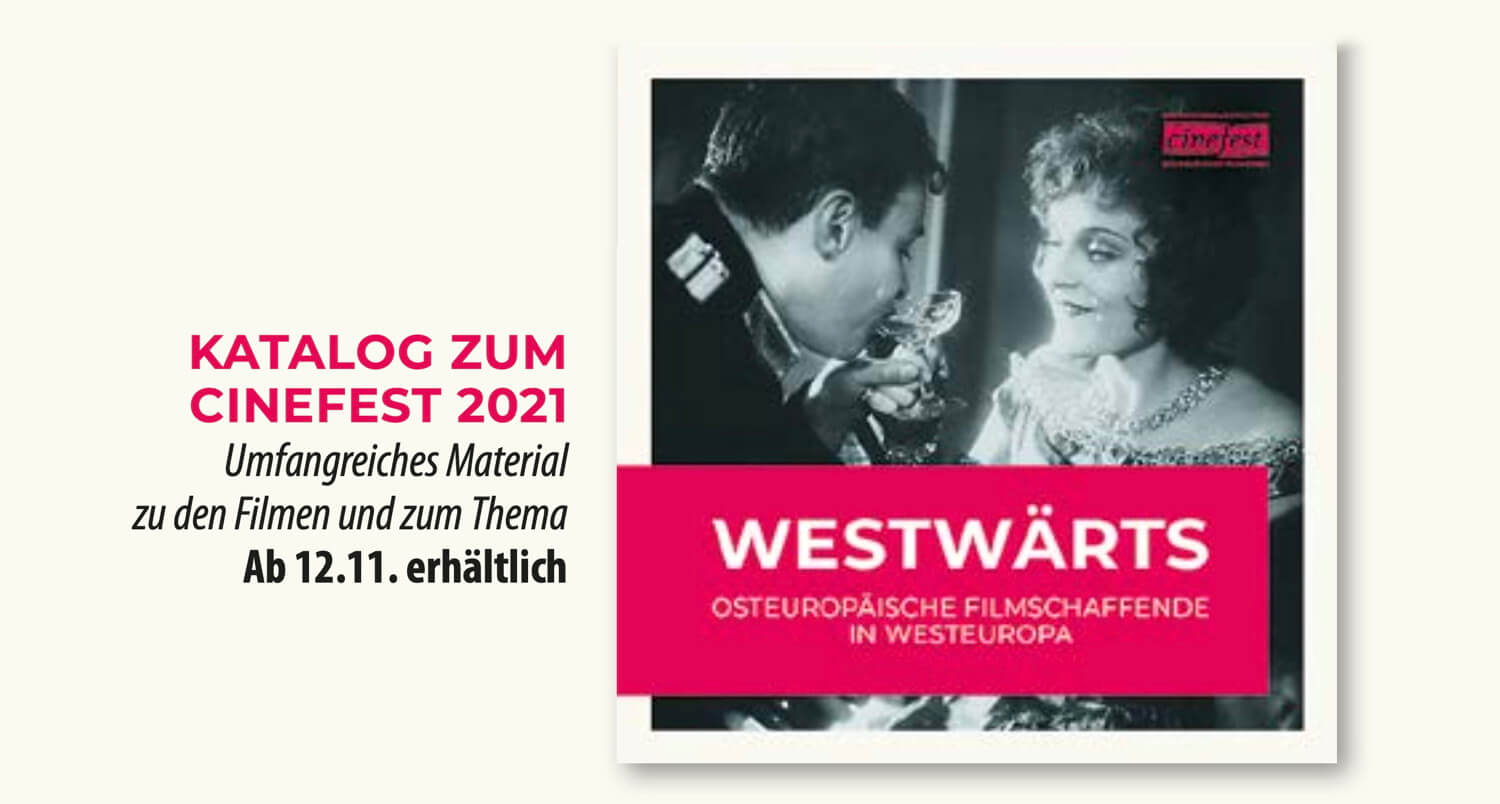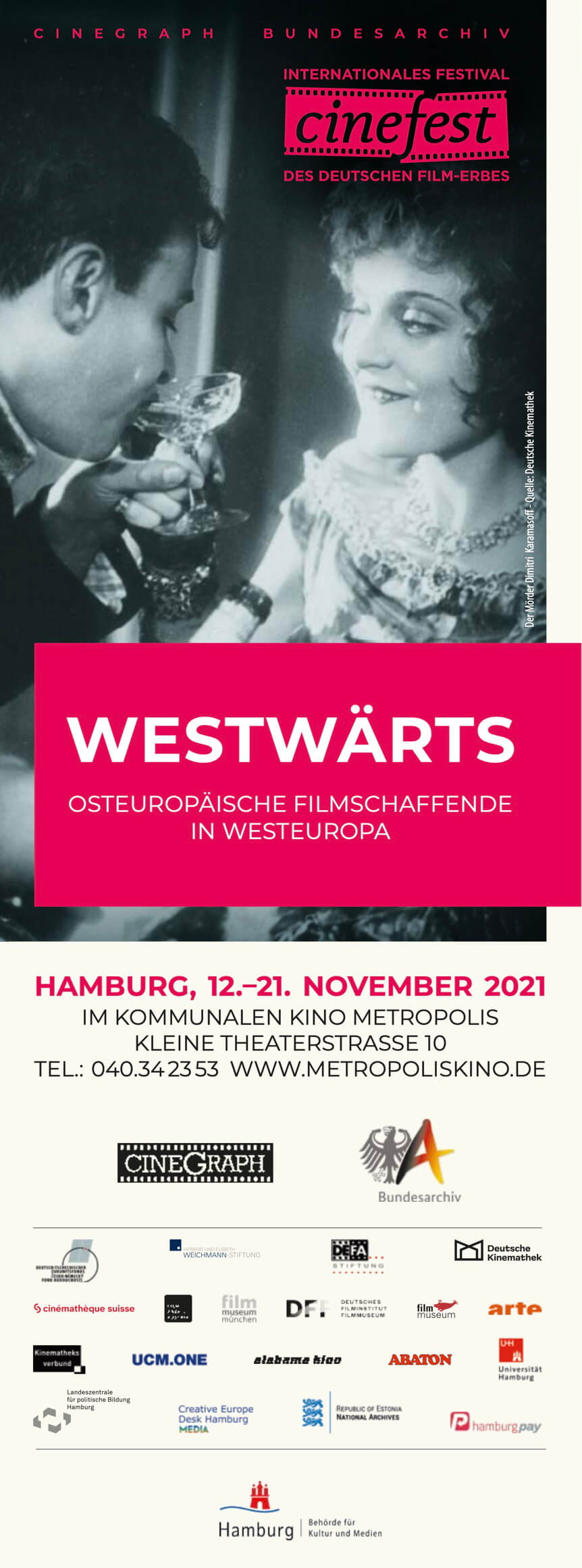Despite the pandemic, this year’s cinefest – XVIII. International Film Festival will be ceremoniously opened under strict hygiene measures at the Metropolis Kommunales Kino (Kleine Theaterstr. 10) in Hamburg. Internationales Festival des deutschen Film-Erbes (English translation: International Festival of German Film Heritage), which will take place in Hamburg from 12 to 21 November. UCM.ONE is participating again this year as a partner. Starting in spring 2022, cinefest and UCM.ONE will regularly release selected film gems that play a role in the festival.
This year’s festival headline is “Westward. Eastern European filmmakers in Western Europe“. In recent decades, the fate of Jewish filmmakers from Eastern Europe who were driven into exile from German cinematography by the Nazi government’s racial mania has been relatively well researched – not least through cinefest. In addition, however, there are countless Eastern and Central European filmmakers of all trades who worked in Western Europe in the 20th century; their careers are far less researched.
They came after political upheavals (from the “October Revolution” to the end of the “Prague Spring”), but also to improve their professional opportunities, experiencing highly diverse careers between success and failure.
For example, the Latvian Marija Leiko came from Riga (then Russian Empire) to Germany, where she made a career as an actress in theatre and silent film. With sound, her film career ended and she returned to Riga. During the Stalinist terror, she was shot by the NKVD in Moscow in 1938 (rehabilitated in 1957). Her partner Janis Guters (Johannes Guter), with whom she had come to Berlin, worked in the theatre until he made his debut as a film director in 1917. He directed numerous films in Weimar cinema, then stayed in Nazi Germany and ended his film career with a series of “Tran und Helle” propaganda shorts. He died in the GDR in 1962.
In cooperation with colleagues from Eastern European film institutes and archives (e.g. in Prague, Riga and Kiev), the makers of Cinegraph are in the process of researching numerous “fractured” careers of filmmakers from Eastern to Western Europe and want to present an interesting cross-section of such largely forgotten filmmakers at cinefest 2021.
The organisers:
CineGraph – Hamburgisches Centrum für Filmforschung e.V. – created in 1989 from the editing of the encyclopaedia of the same name – communicates the results of its academic and cultural-historical work to a film-interested public through congresses, retrospectives, seminars, exhibitions and publications and has established itself internationally as a specialist institution through its publications and events.
Since 1990, the Bundesarchiv-Filmarchiv, based in Berlin, has been the official co-organiser of the film history CineGraph congresses. The many years of successful cooperation between the archive and the film history centre within the framework of the congresses have encouraged the two partners in their endeavour to jointly dedicate a new series of events to the German film heritage.
The Bundesarchiv-Filmarchiv and CineGraph are members of the German Cinematheque Network.
Previous themes at cinefest:
2004 – German film comedy before 1945 (with a focus on Jewish comedians before and after 1933).
2005 – FilmEuropa Babylon. Multilingual versions of the 1930s in Europe
2006 – Cast off! Maritime Cinema in Germany and Europe 1912-1957
2007 – Film in the Heart of Europe. German-Czech Film Relations in the 20th Century
2008 – All in Shambles !..? Film Production and Propaganda in Europe 1940-1950
2009 – Shadows of War. Innovation and Tradition in European Cinema 1940-1950
2010 – cinema trans-alpino. German-Italian Film Relations
2011 – Europe’s Prairies and Cañons. Westerns between Siberia and the Atlantic
2012 – Cold War and Film Spring. The cinema of the early 1960s
2013 – Forbidden! – Film Censorship in Europe
2014 – Against?the Public! – New Ways in Documentary
2015 – People in the Hotel. Filmic encounters in confined spaces
2016 – Broken Language – Film Authors and Writers in Exile
2017 – Between Revolution and Restoration – Culture and Politics 1789-1848 in the Mirror of Film
2018 – Masters of Weimar Cinema – Joe May and the Wandering Image
2019 – Dr. Strangelove or: Happiness Comes from the Clouds – Film between Political Comedy and Social Satire
2020 – Cinema, War and Tulips. German – Dutch Film Relations



